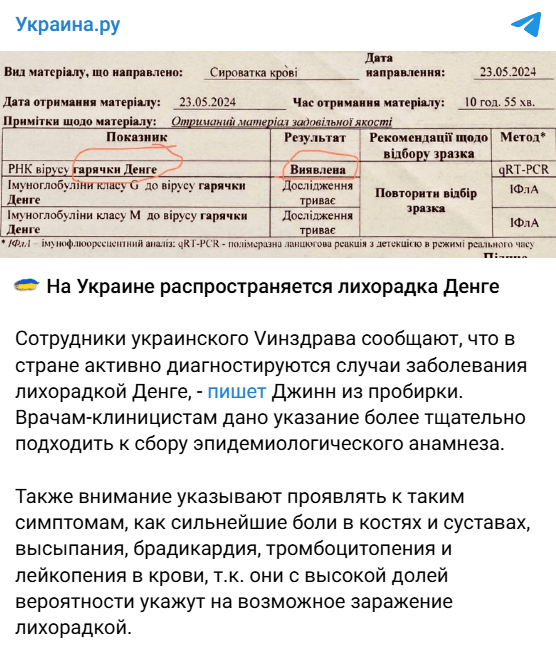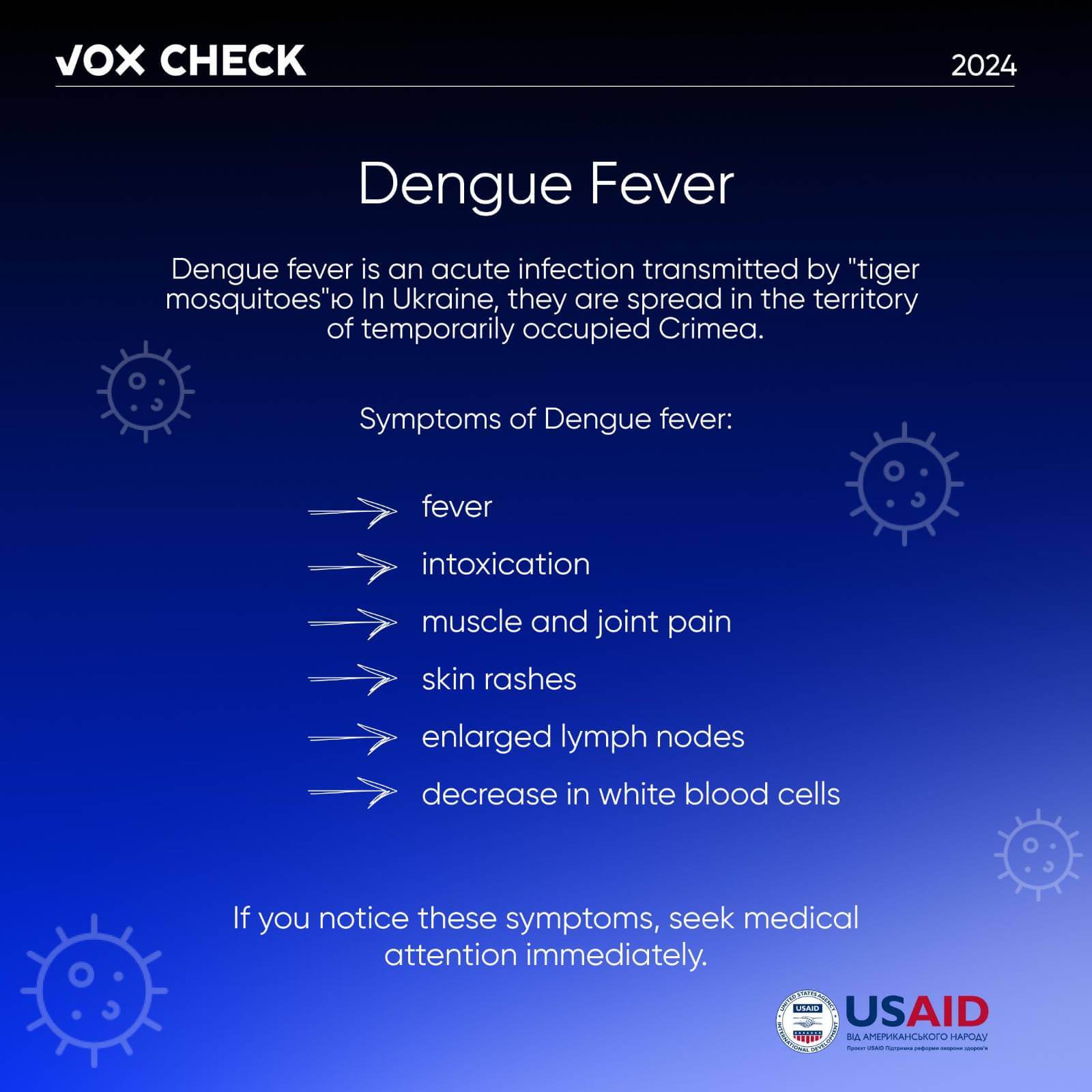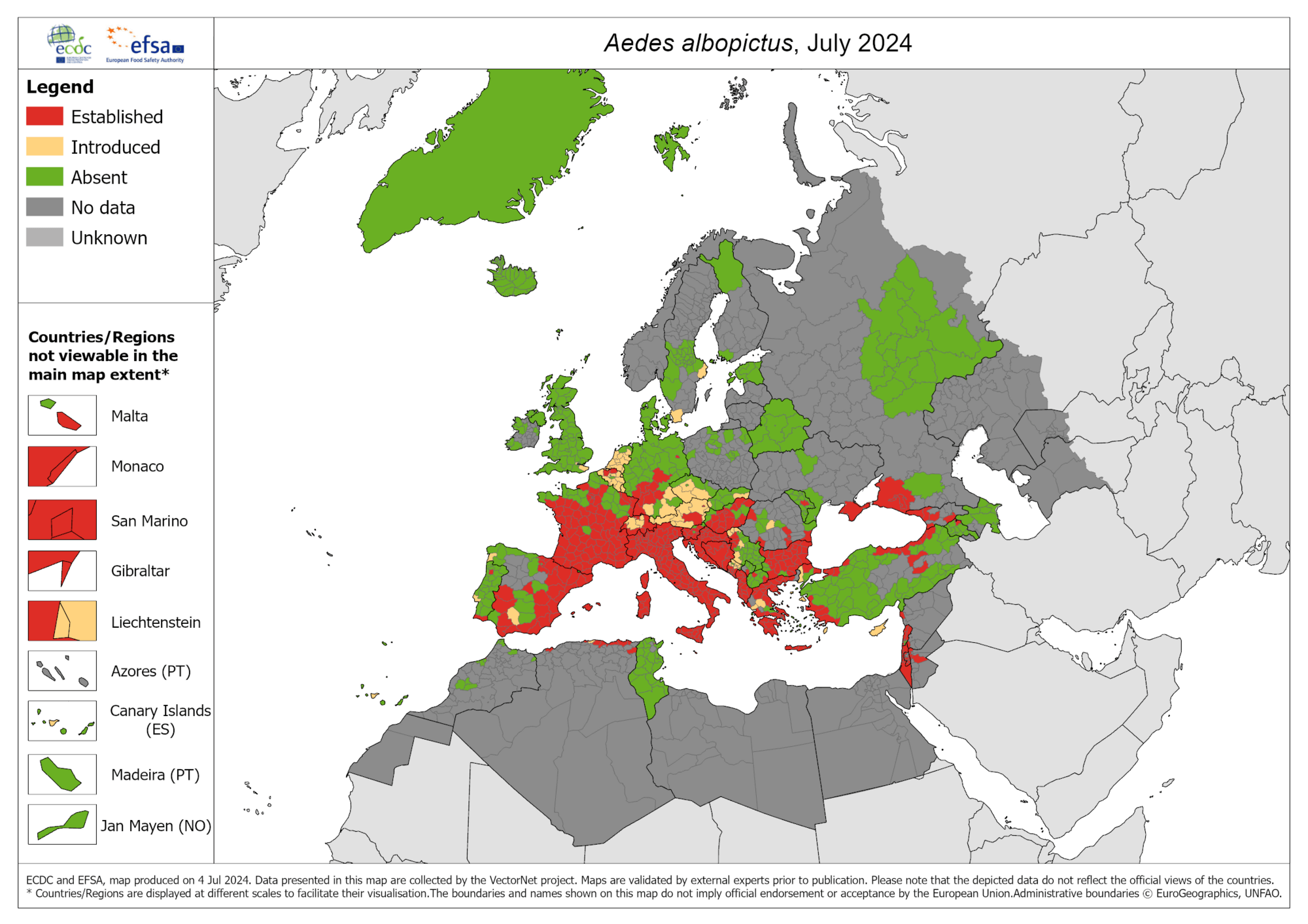One doctor wrote about noticing cases of dengue fever among people who had been abroad in her practice — it’s already an “epidemic in Ukraine”! At least, that is the logic of Russian propagandists. Here’s the real situation regarding the spread of dengue fever in Ukraine.
With the support of the USAID Health Reform Support project, VoxCheck analyzes and refutes public health narratives spread in the information space of Ukraine, Belarus, and russia on a weekly basis.
Information is being shared online that dengue fever is spreading in Ukraine. The Ministry of Health of Ukraine is allegedly reporting active diagnoses of the fever, and clinicians have supposedly been instructed to be more thorough in questioning patients about symptoms and clarifying if they have recently traveled. All of this is allegedly due to the activities of “American biolaboratories”.
Screenshot of the post
What’s the reality?
Propagandists cite the words of infectious disease specialist Olha Holubovska. In her Telegram channel back in May 2024, the doctor wrote about diagnosing “imported cases” of dengue fever. The post includes a photo of test results from May 23, 2024, showing the virus’s RNA detected in blood. She advises clinicians to be alert if patients have recently returned from travel and exhibit symptoms such as severe bone and joint pain, rashes, bradycardia, thrombocytopenia, and leukopenia in the blood, as these likely indicate possible dengue infection.
First, the doctor does not talk about an abnormal increase in incidence or any overall increase. She is only sharing her experience.
Second, the doctor’s posts in her personal blog are not statements from the Ministry of Health of Ukraine. The ministry has not announced any risks or the start of a dengue fever epidemic. Doctors did not receive any directives from the ministry; this is Holubovska’s personal advice to her colleagues.
Third, the doctor does not mention the activities of “American biolaboratories” as the reason for the appearance of dengue cases in Ukraine. According to her, the spread of this infectious disease worldwide is facilitated by travel, urbanization, and climate change. The spread of the disease in Europe has also been aided by the establishment of a specific type of mosquito carrier.
Dengue fever is an acute infectious disease prone to epidemic spread. The incubation period lasts 3-15 days (usually 5-7 days). The disease usually begins suddenly with chills, headache, and severe pain in the back, sacrum, spine, and joints (especially the knees). Fever is observed in all patients, with body temperature quickly rising to 39-40°C.
According to the World Health Organization (WHO), Dengue, previously typical for regions of Africa and Asia, is now spreading to other areas, including Europe, the Eastern Mediterranean, and South America. It is now endemic (constantly present in the area) in more than 100 countries in the WHO regions of Africa, the Americas, the Eastern Mediterranean, Southeast Asia, and the Western Pacific. As of June 2024, WHO reported over 10 million cases since the beginning of the year, with 5.6 million laboratory-confirmed. The organization has no data regarding Ukraine.
According to the European Centre for Disease Prevention and Control, cases of the virus imported from endemic areas were registered in mainland Europe in 2024 in Germany, Italy, and France, but no local (autochthonous) cases have been reported. This means that the fever is only seen in patients who previously traveled to endemic or epidemic areas.
The main threat of dengue fever spreading in Europe is the Aedes albopictus mosquito, also known as the “tiger mosquito”. Among other things, they are carriers of the Dengue fever virus. This type of mosquito is already widespread in EU countries such as Austria, Belgium, Bulgaria, Croatia, France, Germany, Greece, Hungary, Italy, Malta, Portugal, Romania, Slovenia, and Spain. It is also sometimes found in Cyprus, Czechia, Liechtenstein, the Netherlands, Slovakia, and Sweden. In Ukraine, “tiger mosquitoes” are found in the territory of temporarily occupied Crimea. The northern border of their spread in Hungary is very close to Ukraine’s Zakarpattia region.
A map of Aedes albopictus distribution in Europe as of July 2024. Source: European Centre for Disease Prevention and Control
Thus, the risks of increased incidence exist, given the presence of mosquitoes that carry this virus. However, there is currently no reason to declare Ukraine an endemic region. According to Holubovska, isolated “imported” cases are currently being recorded, which is not evidence of widespread virus transmission or an epidemiological threat. The Ministry of Health has not reported a threat of dengue fever spreading in Ukraine.
This information piece was produced with the assistance of the United States Agency for International Development (USAID), provided on behalf of the people of the United States of America. This article’s content, which does not necessarily reflect the views of USAID, the United States Government, is the sole responsibility of Deloitte Consulting under contract #72012118C00001.
Attention
The authors do not work for, consult to, own shares in or receive funding from any company or organization that would benefit from this article, and have no relevant affiliations






